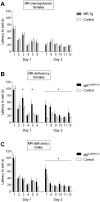Mineralocorticoid receptors guide spatial and stimulus-response learning in mice
- PMID: 24465979
- PMCID: PMC3897662
- DOI: 10.1371/journal.pone.0086236
Mineralocorticoid receptors guide spatial and stimulus-response learning in mice
Abstract
Adrenal corticosteroid hormones act via mineralocorticoid (MR) and glucocorticoid receptors (GR) in the brain, influencing learning and memory. MRs have been implicated in the initial behavioral response in novel situations, which includes behavioral strategies in learning tasks. Different strategies can be used to solve navigational tasks, for example hippocampus-dependent spatial or striatum-dependent stimulus-response strategies. Previous studies suggested that MRs are involved in spatial learning and induce a shift between learning strategies when animals are allowed a choice between both strategies. In the present study, we further explored the role of MRs in spatial and stimulus-response learning in two separate circular holeboard tasks using female mice with forebrain-specific MR deficiency and MR overexpression and their wildtype control littermates. In addition, we studied sex-specific effects using male and female MR-deficient mice. First, we found that MR-deficient compared to control littermates and MR-overexpressing mice display altered exploratory and searching behavior indicative of impaired acquisition of novel information. Second, female (but not male) MR-deficient mice were impaired in the spatial task, while MR-overexpressing female mice showed improved performance in the spatial task. Third, MR-deficient mice were also impaired in the stimulus-response task compared to controls and (in the case of females) MR-overexpressing mice. We conclude that MRs are important for coordinating the processing of information relevant for spatial as well as stimulus-response learning.
Conflict of interest statement
Figures



References
-
- de Kloet ER, Joëls M, Holsboer F (2005) Stress and the brain: From adaptation to disease. Nat Rev Neurosci 6: 463–47. - PubMed
-
- Joëls M, Krugers HJ, Lucassen PJ, Karst H (2009) Corticosteroid effects on cellular physiology of limbic cells. Brain Res 1293: 91–100. - PubMed
-
- Reul JM, de Kloet ER (1985) Two receptor systems for corticosterone in rat brain: Microdistribution and differential occupation. Endocrinology 117: 2505–2511. - PubMed
-
- de Kloet ER, Oitzl MS, Joëls M (1999) Stress and cognition: Are corticosteroids good or bad guys? Trends Neurosci 22: 422–426. - PubMed
-
- Joëls M, Karst H, de Rijk R, de Kloet ER (2008) The coming out of the brain mineralocorticoid receptor. Trends Neurosci 31: 1–7. - PubMed
Publication types
MeSH terms
Substances
LinkOut - more resources
Full Text Sources
Other Literature Sources
Medical
Molecular Biology Databases

